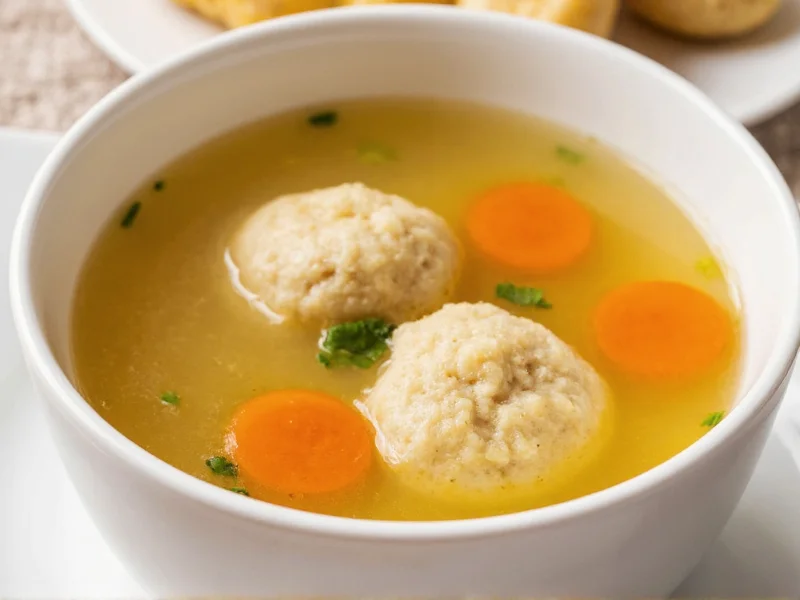Matzo ball soup, affectionately called "Jewish penicillin," has comforted generations with its nourishing broth and tender dumplings. This traditional Ashkenazi Jewish dish originated in Eastern Europe as a way to use leftover matzo meal after Passover. The secret to exceptional matzo ball soup lies in balancing broth clarity with matzo ball texture—achieving either light "floaters" that bob on the surface or dense "sinkers" preferred in some family traditions.
The Foundation: A Flavorful Chicken Broth
While store-bought broth works in a pinch, homemade chicken soup elevates your matzo ball soup from good to extraordinary. The broth serves as both cooking liquid for the matzo balls and the soup base, so its quality directly impacts the final dish.
| Broth Component | Recommended Amount | Flavor Contribution |
|---|---|---|
| Chicken bones (with some meat) | 2-3 pounds | Rich collagen for body and mouthfeel |
| Vegetables (onion, carrot, celery) | 2 cups chopped | Sweetness and aromatic complexity |
| Water | 8-10 cups | Proper dilution for balanced flavor |
| Seasonings (parsley, dill, peppercorns) | To taste | Herbal notes without overpowering |
Simmer your broth gently for 3-4 hours, skimming impurities regularly. For crystal-clear broth, avoid boiling vigorously. Strain through cheesecloth for professional results. Chill overnight to easily remove solidified fat—a crucial step for refined flavor.
Matzo Ball Texture: The Great Culinary Debate
Matzo ball texture divides households into two camps: those who prefer light, airy "floaters" and those who cherish dense, hearty "sinkers." Both styles have merit and technique:
- Light & Fluffy (Floaters): Achieved with seltzer water, baking powder, or extra chilling time. These delicate matzo balls expand significantly during cooking.
- Dense & Hearty (Sinkers): Traditional in some Eastern European communities, these use minimal liquid and more matzo meal for substantial dumplings that sink to the bottom.
The float test reliably indicates doneness—properly cooked matzo balls will rise to the surface when ready. Undercooked matzo balls sink; overcooked ones become tough and disintegrate.
Classic Matzo Ball Soup Recipe
This tested recipe yields 8-10 perfect matzo balls with enough broth for 6 servings. Plan for 1.5 hours total preparation and cooking time.
Ingredients
- 8 cups chilled homemade chicken broth
- 4 large eggs, separated
- 1/2 cup matzo meal
- 3 tablespoons vegetable oil or schmaltz (chicken fat)
- 1/2 teaspoon salt, plus more for broth
- 2 tablespoons seltzer water (for light matzo balls)
- Fresh dill or parsley for garnish
Step-by-Step Instructions
- Prepare broth: Bring chilled broth to a gentle simmer in a wide pot (not boiling).
- Make matzo ball mixture: Beat egg whites until soft peaks form. In separate bowl, combine yolk, oil, salt, and seltzer. Fold in matzo meal, then gently fold in egg whites.
- Chill mixture: Cover and refrigerate for 30-60 minutes (essential for proper texture).
- Shape matzo balls: Moisten hands with cold water. Form 1.5-inch balls (they'll expand during cooking).
- Cook matzo balls: Gently lower into simmering broth. Cover and cook 30-40 minutes without lifting lid.
- Serve: Ladle broth and 1-2 matzo balls into bowls. Garnish with fresh herbs.
Troubleshooting Common Matzo Ball Problems
Even experienced cooks encounter issues with matzo balls. Here's how to solve frequent problems:
- Matzo balls sink and stay dense: Mixture likely needs more chilling time or additional leavening. Try adding 1/4 teaspoon baking powder next time.
- Matzo balls fall apart: Too much liquid or insufficient chilling. Ensure proper egg-to-matzo meal ratio and refrigerate mixture adequately.
- Broth becomes cloudy: Boiling too vigorously or adding matzo balls to rapidly boiling liquid. Maintain gentle simmer throughout cooking.
- Matzo balls too tough: Overmixing the batter or overcooking. Handle mixture gently and follow timing precisely.
Delicious Variations to Explore
Once you've mastered the classic recipe, experiment with these authentic variations:
- Schmaltz-enhanced: Traditional cooks use rendered chicken fat (schmaltz) instead of oil for richer flavor that connects to Jewish culinary heritage.
- Herb-infused: Add 1 tablespoon finely chopped fresh dill or parsley to the matzo ball mixture for aromatic depth.
- Gluten-free option: Substitute matzo meal with finely ground almonds or certified gluten-free matzo meal for dietary needs.
- Vegetable broth version: Create a satisfying vegetarian alternative using mushroom or vegetable stock with extra umami boosters.
Serving and Storage Tips
Matzo ball soup tastes best when served immediately, but proper storage maintains quality. Cool completely before refrigerating in airtight containers for up to 4 days. Freeze broth and matzo balls separately for longer storage—matzo balls absorb too much liquid when frozen with broth.
When reheating, gently warm broth first, then add matzo balls to prevent disintegration. For Passover celebrations, prepare broth and matzo ball mixture ahead, but cook matzo balls fresh for optimal texture.
Why This Recipe Works
This matzo ball soup recipe succeeds by respecting traditional techniques while incorporating modern precision. Separating eggs creates lift in the matzo balls, while proper chilling time allows the matzo meal to fully hydrate without becoming gummy. Using chilled broth prevents the matzo balls from breaking apart during cooking. These subtle techniques transform simple ingredients into soul-satisfying comfort food that honors culinary tradition while delivering consistent results.











 浙公网安备
33010002000092号
浙公网安备
33010002000092号 浙B2-20120091-4
浙B2-20120091-4